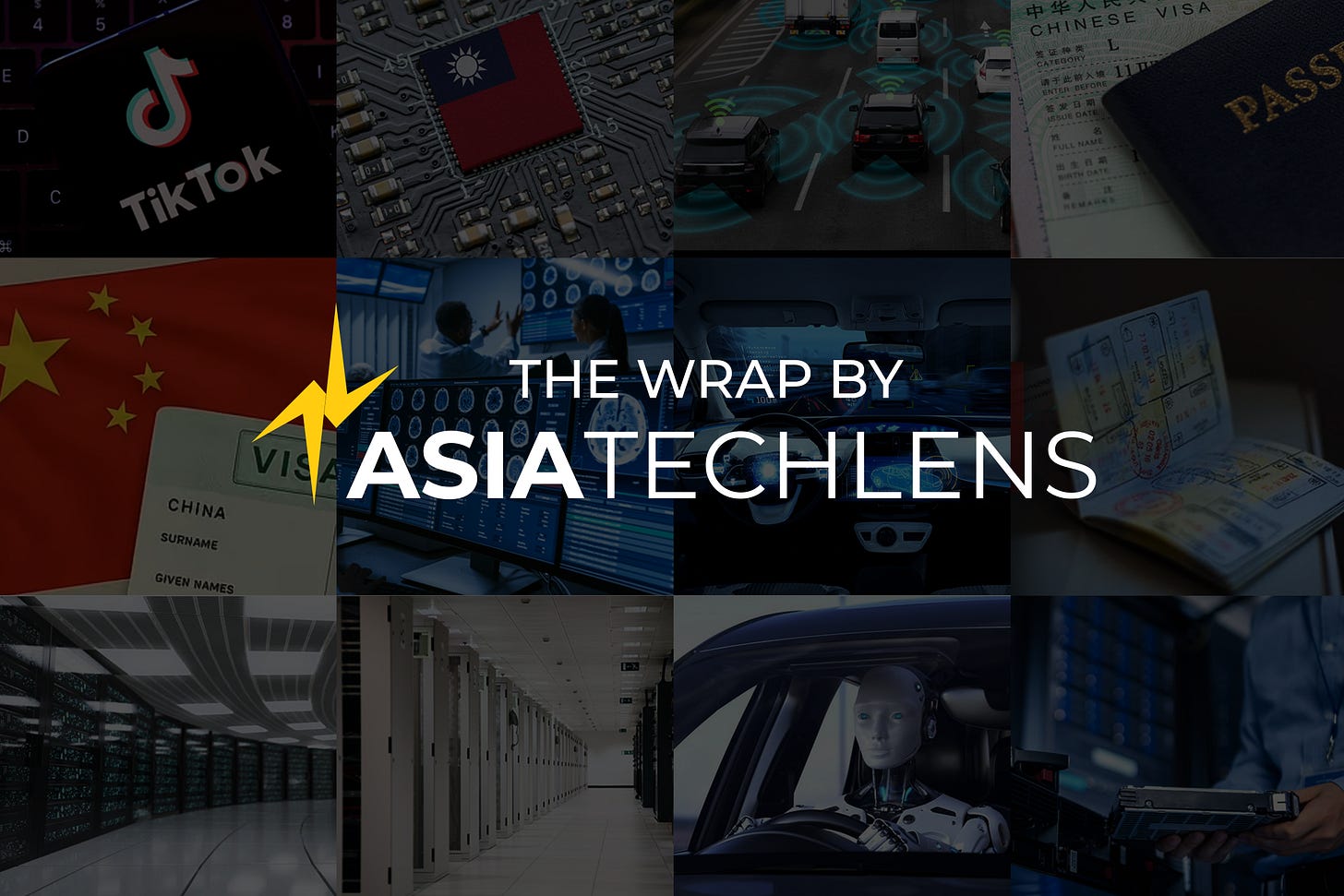The Wrap | 4 - 10 Oct 2025
Asia Tech Lens’ weekly digest: news, context, and signals shaping Asia’s tech future
Editor’s Note: Welcome back to The Wrap by Asia Tech Lens, our weekly digest of the signals, shifts, and stories shaping Asia’s tech future.
Each Friday, we highlight the week’s most important developments, with the context and bottom lines that matter. Whether it’s chips, AI, mobility, or education, our goal is to connect the dots across Asia’s fast-changing tech landscape.
We’d love to hear your feedback as we refine this series; reply directly or drop us a note on LinkedIn.
Robotics | Japan
Masayoshi Son just made his biggest robotics bet yet: a $5.4 billion grab for ABB Robotics to fuse AI with machines
Shares of SoftBank Group jumped ~13% after it agreed to buy the robotics arm of Swiss engineering giant ABB, turbo-charging Son’s “physical AI” push to merge Arm’s chips, OpenAI’s models, and real-world robots. The group already backs AutoStore Holdings and Agile Robots, underscoring how deep Son’s automation play now runs.
Bottom Line: Pending regulatory clearance, this buy would boost Son’s ‘physical AI’ vision, syncing Arm’s chip computing with OpenAI’s AI models and real-world factory robots.
AI | Korea
Korea’s 500-Factory AI Push Could Redefine Its Manufacturing Edge
Seoul unveiled plans for more than 500 projects to embed AI into manufacturing over the next five years, aiming to transform industry under President Lee Jae-myung’s “super-innovation economy” agenda. Early projects include Samsung’s use of AI to boost HBM inspection rates above 99%, HD Hyundai’s ship repair robots, and Hyundai Motor’s robotic arms.
Bottom Line: Positioned under the ‘super-innovation economy,’ this underscores the pivot from pilots to production-grade AI on the shop floor.
AI | China
Tencent Edges Google in Text-to-Image Rankings
Tencent’s open-source Hunyuan Image 3.0, released in late September, has climbed to No. 1 on a major public leaderboard, where users vote on side-by-side image results. With 80 billion parameters, it’s now the largest open-source image-generation model to date, dethroning Google DeepMind’s Gemini 2.5 Flash Image (“Nano Banana”), famed for its precision in image editing and 3D figurine rendering.
Bottom Line: Tencent’s rise signals the Chinese firm’s return to open-source AI dominance, and a quiet blow to its Western counterpart.
AI | E-Commerce | India
India Pilots AI Chatbot-led e-commerce with ChatGPT
India has kicked off a pilot that lets consumers shop and pay via AI chatbots, debuting on ChatGPT and and planning for Google’s Gemini and Anthropic’s Claude integrations. Led by NPCI and Razorpay, the pilot uses UPI Reserve Pay to securely hold funds for merchants, with payment finalized in-chat after two-factor authentication, ensuring AI apps don’t access payment details.
Bottom Line: If it works, and security, smooth UX, and merchant adoption hold, India could take chat-based shopping mainstream.
AI | Singapore
3 in 4 Singapore teachers use AI in class, more than double overseas peers
In Singapore, 75% of teachers use AI in classrooms or for lesson preparation, more than double the 36% among overseas peers. Most teachers see benefits for curriculum planning (82%) and admin automation (74%), and online or hybrid models are used by 81% of schools. But only 38% feel equipped to design AI-driven tasks for special education needs, versus 62% globally, flagging a training gap.
Bottom Line: High AI usage, but teacher training for special needs lags behind OECD peers.
Gaming | Thailand
Thailand eyes ASEAN’s first Game Act to curb “hidden gambling”
Thailand’s Digital Economy Promotion Agency (DEPA) is pushing a Game Industry Promotion Act, the country’s first dedicated games law and the first of its kind in ASEAN. If passed, the law would regulate chance-based monetization (loot boxes, prize draws, points-for-prizes), create a central oversight framework, and empower Cyber Police to suspend unregistered games and audit operators for safety, fairness, and transparency.
Bottom Line: If passed, Thailand would set a precedent in Asia for gamer protection and studio regulation.
Signals to Watch
If global regulators approve/reject the deal, this will determine whether SoftBank’s “Physical AI” strategy can move forward.
If NPCI expands the chatbot shopping pilot to more merchants or regions, this will indicate chat-based e-commerce is ready to scale beyond tests.
If the bill passes with enforceable “hidden gambling” definitions, then Thailand sets the ASEAN template and pushes publishers to redesign monetization.


